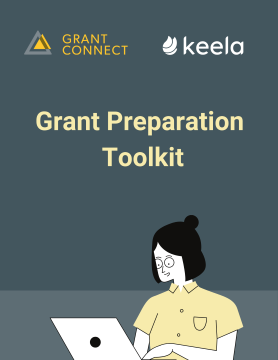For most nonprofits, the grant writing season never actually ends. As you complete one grant proposal, you may have to write another. In truth, the grant writing season is more of a cycle than anything else. Your organization always has to be on the lookout for funders and ready to apply for a grant anytime during the fiscal year.
Sourcing funders, working on grant applications, and writing grant proposals can be time-consuming, especially for small and medium-sized nonprofits. It's important to be prepared well in advance for grant applications, and every now and then, you need to assess your nonprofit's grant readiness to ensure that you can apply for grants quickly if and when the need arises.

This post explores six questions you need to answer when assessing your nonprofit's grant readiness. It also includes a free grant preparation toolkit that you can use as a checklist to ensure that you're well prepared for your next grant application.
1. Have You Received Tax-Exempt 501(c)(3) Status?
Grant eligibility for most funders in the United States requires nonprofits to be incorporated and have federal 501(c)(3) tax-exempt status. Nonprofits with tax-exempt status are eligible for deductible contributions and can avoid paying income taxes on profits. Funders generally prefer working with nonprofit organizations that have established tax-exempt status because it allows them to show the Internal Revenue Service (IRS) how their funds are being used.
To receive tax-exempt status, your organization must first file articles of incorporation with your state's corporate filing office. After being incorporated, you can file for a federal 501(c)(3) tax-exempt status with the IRS. Most nonprofits do not have to renew their status, but if your organization hasn't submitted annual reports to the IRS in three consecutive years, chances are you've lost your tax-exempt status and will need to reapply.
Remember, tax-exempt status is one of the first conditions for grant eligibility. So, be sure to confirm your organization's status first before doing anything else.
2. Do You Have a Clearly Defined Mission Statement?
Your nonprofit's mission statement should outline your organization's purpose, value, services, scope of operations, intended impact, and outcomes. It should be clear, concise, and consistent with your current work. Funders need to know that your nonprofit's values align with theirs, so ensure that your mission statement clearly communicates that.
If your nonprofit already has a mission statement, now's a good time to review and be sure it is consistent with your current objectives and outcomes as an organization. If you don't have a mission statement, you can learn how to write the perfect nonprofit mission statement here.
3. Do You Have Board Members?
Board members are key decision-makers in nonprofits; they are an integral part of the leadership structure in organizations. A good nonprofit board would also participate in the organization's fundraising and stewardship activities, which could be incredibly helpful when applying for grants.
Your nonprofit board can help your team choose the right funders and complete grant applications. They can lend their expertise and voice by communicating your nonprofit's impact to funders. Before applying for grants, get your board's buy-in. You need to be prepared to answer specific questions they may have about funders, the grant application process, and the grant requirements. You should also encourage them to get involved in the grant application process.
4. Do You Have Credibility and Capacity?
Funders want to see a track record of your nonprofit's impact and progress in dealing with issues faced by your communities. If you're a new, small nonprofit, you can share your founder's experience contributing to your community. For established and larger nonprofits, you may need to show reports and documentation that highlight the outcomes and accomplishments that the organization has made over the years.
Along with your nonprofit's credibility, you also need to consider your team's capacity to execute the projects, programs, and campaigns the grants will fund. Funders will want to know the makeup of your team and how your team plans to go about using the grants. So, before applying for a grant, be sure you understand the degree of work associated with that grant and confirm that your team is up to the challenge.
5. Do You Have Community Partners?
Community partnerships are a great way to show funders the value of your nonprofit's work within your community. Community partners, such as other nonprofits, local businesses, city councils, schools, or faith-based organizations, can be helpful to your grant applications. In some cases, having community partners is required for grant applications.
To boost your nonprofit's chance of getting approved for more grants, you should consider partnering with more organizations and businesses in your community. If you already have community partners, start drawing reports highlighting your partnerships' outcomes and successes. You could also consider teaming up with a partner to apply for specific grants; this could be an excellent way to pool resources and show funders that you can meet the conditions of the grant.
6. What Is Your Process for Measuring Impact?
Getting approved for a grant is half of the work; the other half involves executing the projects and programs stated in your grant proposal. A good way to show funders that you can complete these projects is by detailing how you will track your nonprofit's grants and measure your progress over time.
To do this, your organization would need to implement a solid system and enlist the right tools for measuring impact. You need to identify and monitor the key performance indicators (KPIs) relevant to your programs. Consider using a tool like Keela to record, report on, and share updates about campaign transactions and revenue associated with each grant.
Use This Grant Preparation Toolkit to Get Ready for Your Next Grant Proposal
Sourcing funders, working on grant applications, and writing grant proposals can be challenging, time-consuming, and tiresome. Without a proper system for managing and streamlining your grant application process, you could easily wear your team out. With this in mind, Keela has partnered with Imagine Canada's Grant Connect to create a Grant Preparation Toolkit to help you prepare for your next grant proposal.
You can use this toolkit to save time on your grant writing process by gathering, outlining, and recording all the details you'll need well in advance. Most importantly, this toolkit will help your team narrow its focus, understand your organization's current challenges and need for grant funding, and determine what kind of grants and funders align best with your nonprofit's values and objectives.
You can download the free Grant Preparation Toolkit here.
About the Author
Tobi Nifesi is a curious writer who enjoys striking a balance between storytelling, technology, and social action. At Keela, he manages the creation and distribution of educational resources that empower nonprofits and charity organizations to do more good.
Additional Resources
- Sign up for TechSoup Courses' Grant Writing and Management series.
- Read the many TechSoup blog posts about grant writing.
- See a webinar on Driving Greater Effectiveness for Boards of Directors.
- Discover A Few Things to Consider for Impact Measurement at Your Nonprofit.
Top photo: Shutterstock









